Preparing 400-201 exam with vaild 400-201 exam dumps, trying PassLeader’s 400-201 vce dumps or 400-201 pdf dumps, our 400-201 exam dumps coverd all the real exam questions, all new 400-201 exam questions are available in PassLeader’s 400-201 braindumps. Our 245q 400-201 premium vce file is the best study guide for preparing 400-201 exam, browsing PassLeader’s website and download 245q 400-201 exam questions.
keywords: 400-201 exam,245q 400-201 exam dumps,245q 400-201 exam questions,400-201 pdf dumps,400-201 practice test,400-201 vce dumps,400-201 study guide,400-201 braindumps,Cisco CCIE Service Provider Written Exam v4.0/v4.1
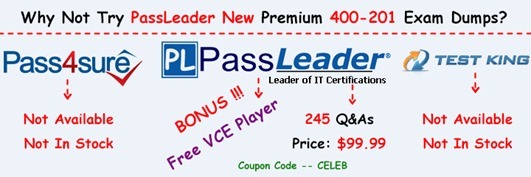
QUESTION 41
Which is the RP address of the IPv6 multicast address FF76:0:130:1234:5678:9abc::4321?
A. 4321:5678:9abc::30
B. 4321:5678:9abc::13
C. 1234:5678:9abc::130
D. 1234:5678:9abc::1
E. 1234:5678:9abc::13
Answer: D
Explanation:
http://www.netcraftsmen.com/wp-content/uploads/2014/12/20090429-CMU-Introduction_to_IP_Multicast.pdf (page53)
QUESTION 42
In an MPLS VPN environment, the QoS making over the MPLS backbone must be different from the one that is received from the customer. The forwarding on the egress PE is based on the marking that is set by the ingress PE. Which null label and QoS mode can achieve this?
A. MPLS explicit null with pipe mode
B. MPLS implicit null with short pipe mode
C. MPLS implicit null with uniform mode
D. MPLS explicit null with uniform mode
E. MPLS explicit null with short pipe mode
F. MPLS implicit null with pipe mode
Answer: A
QUESTION 43
Drag and Drop Questions

Answer:

QUESTION 44
Which is the main goal of BGPsec regards to improve BGP security?
A. Reduces risk of improper route propagation from unauthorized AS numbers
B. Configures BGP route verification by storing routes in a database used to validate AS numbers
C. Adds encryption to route propagation outside the iBGP AS
D. Increases legitimacy and authenticity of BGP advertisements
Answer: D
Explanation:
https://tools.ietf.org/html/draft-lepinski-bgpsec-overview-00
QUESTION 45
Drag and Drop Questions
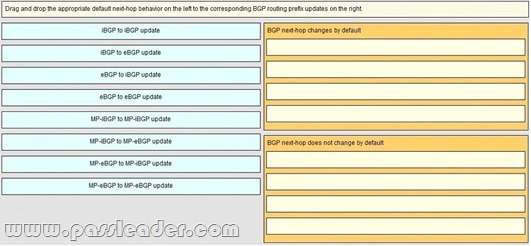
Answer:
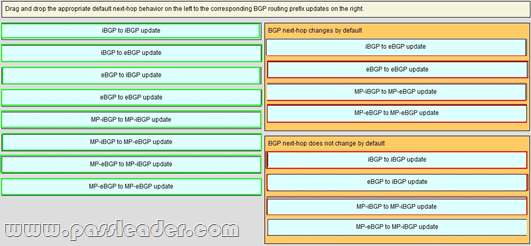
QUESTION 46
What is the BGP synchronization rule?
A. BGP should not advertise a route until that route has been learned via an IGP.
B. Routing information received through an EBGP session is not forwarding to another EBGP neighbor, only to IBGP neighbors.
C. BGP neighbor peering are established and synchronized using TCP.
D. BGP should not advertise a route when that route has been learned via an IGP.
E. Routing information received through an IBGP session is not forwarding to another IBGP neighbor, only to EBGP neighbors.
Answer: A
QUESTION 47
Refer to the exhibit. R2 and R3 cannot install IS-IS IPv6 routes. What is the root cause?
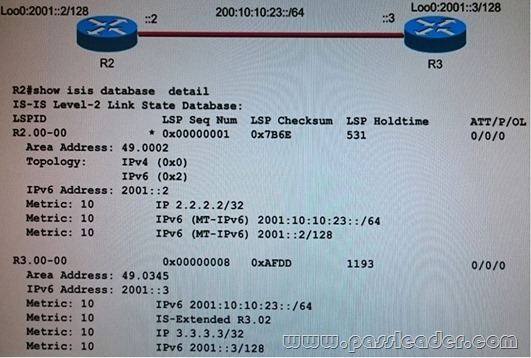
A. R2 is missing the metric-style wide command under the IS-IS process.
B. R3 is missing the multi-topology transition command under the IS-IS address-family IPv6 process.
C. R2 is missing the multi-topology command under the IS-IS address-family IPv6 process.
D. R3 is missing the metric-style wide command under the IS-IS process.
Answer: B
QUESTION 48
Which statement about Software Maintenance Upgrade is true?
A. CRS-1 SMU can be applied to a different platform, and vice versa.
B. SMU is an executable code for running a process or libraries that are shared between the different processes.
C. SMUs for each release are individually downloadable from Cisco.com and come in the form of a tar ball.
D. SMUs provide software fixes for critical network down and qualification blocking issues. Therefore, every software defect has a corresponding SMU.
E. SMUs are release-specific. If an issue affects multiple platforms or releases, an SMU is built separately for each release and each platform.
Answer: E
Explanation:
SMUs for each release are individually downloadable from Cisco.com, whereas the bootable files and optional PIEs come in the form of a tarball. SMUs are release specific. If an issue affects multiple platforms or releases, an SMU will be separately built for each release and each platform depending on the mission-critical need.
A CRS-1 SMU cannot be applied to a different platform, and vice versa. SMUs provide software fixes for critical network-down and qualification-blocking issues. Therefore, every software defect will not have a corresponding SMU.
QUESTION 49
Which three statements about the Cisco MPLS TE Fast Reroute (FRR) process are true? (Choose three.)
A. TE tunnels that are configured with the FRR option cannot be used as backup tunnels.
B. TE tunnels that are configured with the FRR option can be used as backup tunnels.
C. The backup tunnel that is used to protect a physical interface must have a valid IP address configured.
D. Interfaces must use MPLS global label allocation.
E. The source IP address of use backup tunnel and the merge point (MP) should not be reachable.
Answer: ACD
QUESTION 50
Refer to the exhibit. Two MPLS TE tunnels are configured with a total bandwidth guarantee of 100 Mbps. However, Tunnel 1 has a requirement to have one-fifth of this total bandwidth. Which two configurations accomplish this goal? (Choose two.)
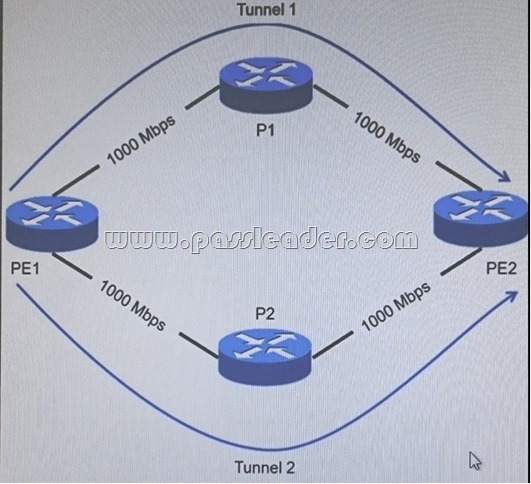
A. Configure tunnel mpls traffic-eng bandwidth 20000 under the Tunnel 1 interface.
B. Configure bandwidth 20000 under the Tunnel 1 interface.
C. Configure tunnel mpls traffic-eng bandwidth 80000 under the Tunnel 2 interface.
D. Configure bandwidth 80 Mbps under physical interfaces in the path PE1-P2-PE2.
E. Configure bandwidth 20 Mbps under physical interfaces in the path PE1-P1-PE2.
F. Configure bandwidth 80000 under the Tunnel 2 interface.
Answer: AC

http://www.passleader.com/400-201.html
QUESTION 51
With the BGP peerings shown, which 3 solutions are most correct? (Choose three.)
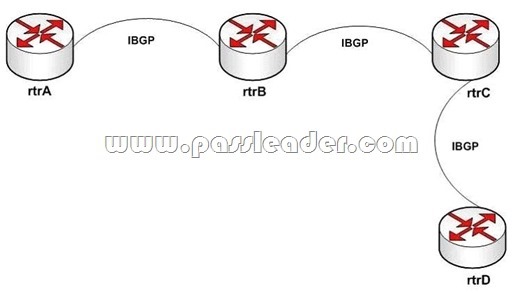
A. rtrA and rtrD are route-reflector-clients; rtrB and rtrC are route reflectors part of the same cluster.
B. rtrA and rtrD are route-reflector-clients; rtrB and rtrC are route reflectors part of the different cluster.
C. rtrA, rtrB and rtrC are part of a confederation sub-AS and rtrD is part of a different confederation sub-AS.
D. rtrA, rtrB are part of one confederation sub-AS and rtrC, rtrD are part of a different confederation sub-AS.
E. rtrA, rtrB and rtrC are part of a confederation sub-AS where rtrB is a route reflector and rtrA, rtrC are routereflector-clients.
Answer: BDE
QUESTION 52
Drag and Drop Questions

Answer:

QUESTION 53
What is the default BGP scanner time?
A. 10 minutes
B. 5 minutes
C. 120 seconds
D. 60 seconds
E. 30 minutes
Answer: D
Explanation:
The scanning interval of BGP routing information. Valid values are from 15 to 60 seconds. The default is 60 seconds.
QUESTION 54
What ISIS TLVs are used to support MPLS Traffic Engineering? (Choose three).
A. Extended IS neighbor TLV #22
B. Extended IS name TLV #137
C. Extended IS resource TLV #138
D. Extended IS reachability TLV #135
E. Router ID TLV #134
Answer: ADE
QUESTION 55
A Service Provider connects to a client site that has two CEs. These CEs have a backdoor link for backup. OSPF is used as the routing protocol in this environment. You want to ensure that client traffic prefers the service provider connections for routing instead of the secondary connection. Which option describes the default behavior and the action that accomplishes your goal?
A. The routes to the Service Provider are not preferred, due to the increased OSPF cost through the service provider network. Ensure that the cost on the links to the service provider are lower than the secondary connection.
B. The routes to the Service Provider are seen as external type 1 in the OSPF database. Configure a domain ID that is the same across all PEs, to ensure that customers see routes as intra-area.
C. The routes to the Service Provider are seen as interarea OSPF routes through the network. Configure a sham link to create a new intra-area path across the service provider network between the PE routers that service the client.
D. The routes to the Service Provider are seen as equal and cause nondeterministic traffic patterns. Ensure that the secondary connection has a higher cost than the links to the service provider.
Answer: C
QUESTION 56
Which two statements about OSPF IPv6 routing are true? (Choose two)
A. It requires OSPF version 3
B. automatically detects neighbors over NHMA interfaces
C. It supports encryption using
D. It uses LSA type 9
E. It uses LSA type 8
Answer: AE
QUESTION 57
Which two statements about forwarding equivalence class (FEC) are true? (Choose two)
A. FEC might correspond to a destination IP subnet, but it might also correspond to any traffic class that the edge LSR considers significant.
B. FEC is a group of IP packets that is forwarded over a different path, but with the same forwarding treatment.
C. FEC is a group of IP packets that is forwarded over the same path, and with the same forwarding treatment.
D. FEC is a group of IP packets that is forwarded over a different path, but with the different forwarding treatment.
E. FEC is a group of IP packets that is forwarded over the same path, but with a different forwarding treatment.
Answer: AC
QUESTION 58
Refer to the exhibit. Which attached circuit interface shown uses VC Type 4?

A. Gi8/0/1
B. AT1/0
C. Se5/0
D. ATM2/0
E. Gi4/0.1
Answer: E
QUESTION 59
Which three choices are BGP Extended communities used in MPLS-VPN deployment? (Choose three).
A. Site of Origin SOO
B. Route-Distinguisher
C. Route-Target
D. Domain Identifier
Answer: ACD
Explanation:
BGP Extended Communities for OSPF PE/CE routing: A Domain Identifier (Domain ID) is defined as BGP Extended Community which is carried with VPNv4 routes between PE routers. This Domain ID is used to identify the OSPF instance from which it was redistributed into BGP.
QUESTION 60
An engineer is working to provide high availability to a Service Provider core network. Which BGP command enables a backup path to be installed in the RIB and CEF tables?
A. maximum-paths ibgp
B. bgp additional-paths install
C. maximum-paths eibgp
D. bgp additional-paths select
E. bgp advertise-best-external
Answer: B

http://www.passleader.com/400-201.html